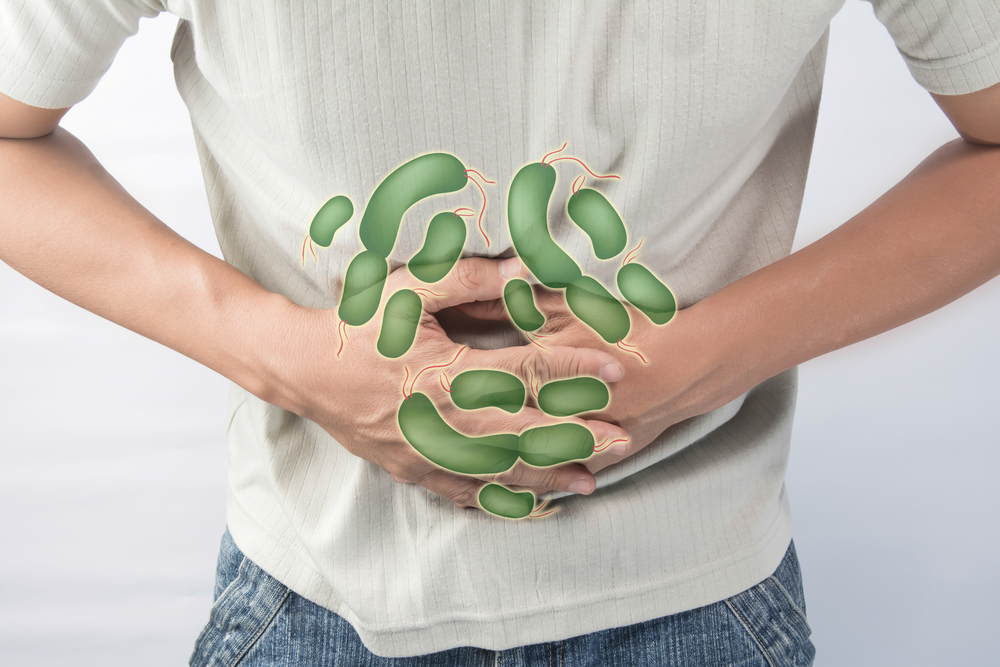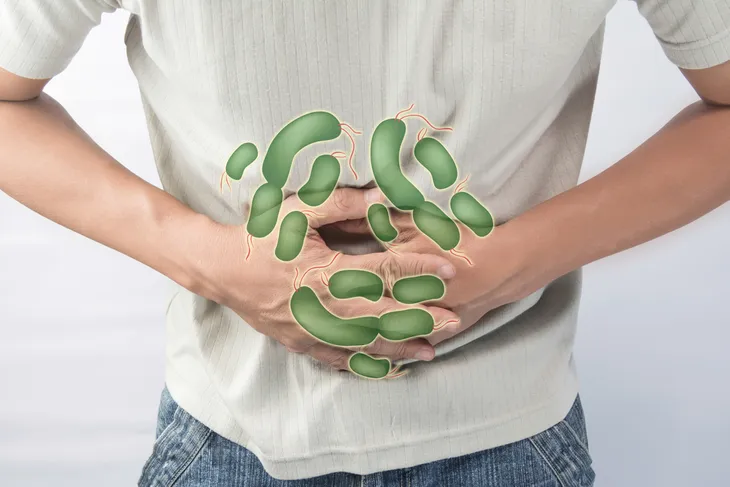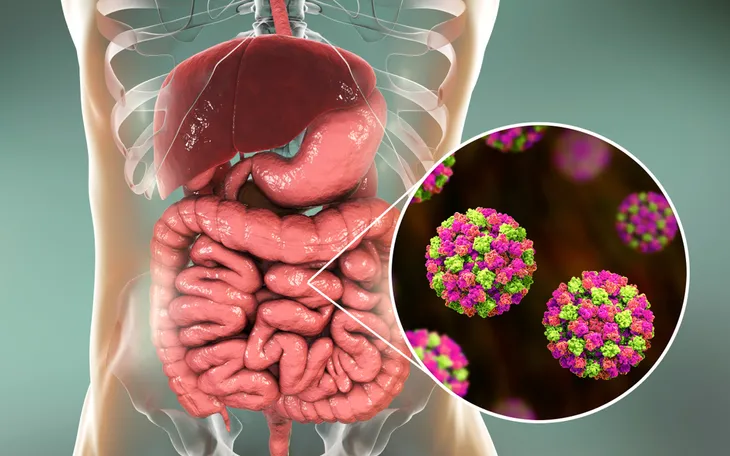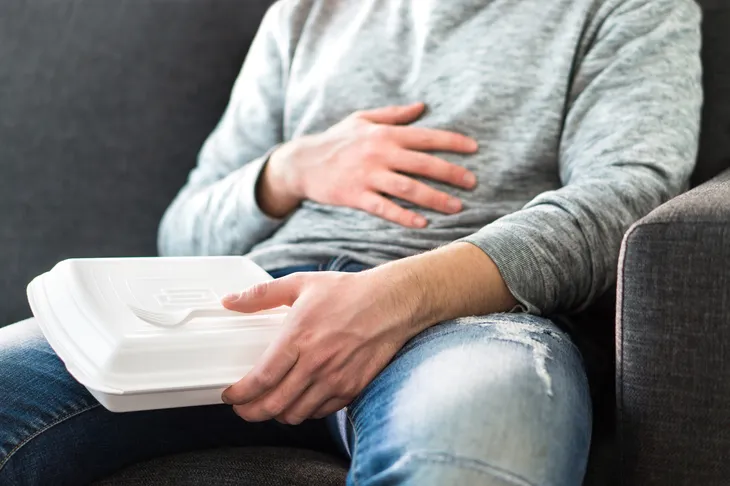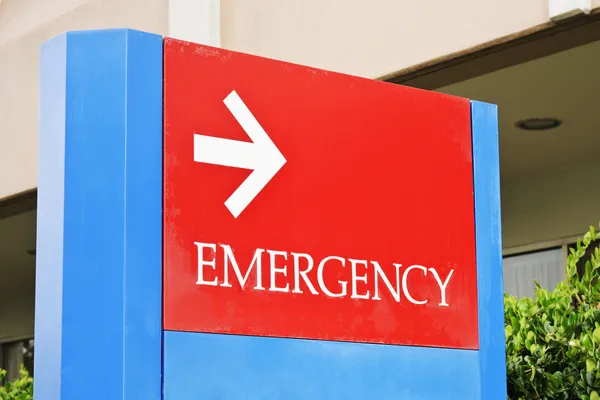It has happened to all of us—that rush to the bathroom following a questionable dinner that leaves us hugging the toilet for 24-hours of misery. However, this embarrassing debacle often leaves us scratching our heads over whether we have food poisoning or the stomach flu.
It’s tough to tell which you have since the symptoms can often be identical. But there are several subtle differences to help you decipher between food poisoning and the stomach flu…
The Telltale Symptoms of Food Poisoning
You can hardly ignore the symptoms of food poisoning. For one, they often leave you debilitated for days with symptoms of weakness, dizziness, nausea, vomiting, and even bloody, explosive diarrhea to expel the bad food (e.g., Salmonella) from your system. However, the symptoms of food poisoning are often mistaken for the stomach flu, even though there is a big difference between how each illness affects your body.
With the stomach flu, a virus attacks your intestines (e.g., norovirus or rotavirus). Plus, you contract a stomach virus by coming into close contact with someone who is infected (i.e., you may touch the same object or share food). A stomach flu virus can also be transmitted via contaminated food or water. On the other hand, food poisoning is transmitted via contaminated food that contains infectious organisms, such as viruses, parasites, or bacteria (e.g., E. coli).
The Telltale Symptoms of the Stomach Flu
Symptoms of the stomach flu (known clinically as gastroenteritis) often mimic those of food poisoning, with fatigue, muscle aches and pains, chills, stomach cramps, vomiting, diarrhea, and high fever. However, the stomach flu is most often caused by a virus entering in the digestive tract rather than from consuming bad food or water.
A prime differentiator between stomach flu and food poisoning is symptom presentation. For exmaple, stomach flu symptoms start a few days following exposure to the virus and typically last 2- to 10-days. Symptoms of food poisoning, however, flare up within hours of eating contaminated food with vomiting and nausea lasting 1- to 10-days, until the body rids the food bacteria completely from your system.
The Onset of Food Poisoning
The onset of food poisoning is swift. It only takes a 4- to 6-hours after eating tainted food to fall ill and start experiencing the violent symptoms from bacteria, such as E. coli. Although the stomach flu can have similar symptoms, such as nausea and vomiting, fever, fatigue, loss of appetite, and diarrhea, other symptoms, such as headache and muscle aches, are common with the stomach flu and not food poisoning.
At the same time, with the absence of headache and muscle aches, food poisoning typically results in abdominal pain that can be quite severe in addition to the common signs of nausea, vomiting, fever, and fatigue. It’s vital to remain hydrated with beverages, such as water and herbal tea, as you battle food poisoning. Dehydration is dangerous and lowers your immune system, weakening its ability to fight off bacteria and viruses.
The Onset of Stomach Flu
The stomach flu, which is a typically a viral infection of the digestive system, takes a little longer to brew trouble. You will notice symptoms, such as stomach cramping, nausea, and vomiting, approximately 12-hours after your intestines are overrun with illness. Although there is much overlap in the symptoms between it and food poisoning, the general malaise you get with the stomach flu is different. Symptoms of headache and muscle aches are symptomatic of the flu and not so much of food poisoning.
Even though its vital to replace lost fluids with both the stomach flu and food poisoning, recovery from the stomach flu requires lots of rest as well as steering clear of rich and fatty foods in favor of bland foods (i.e., applesauce, bananas, toast, rice, and potatoes) that are gentle on the recovering intestinal tract. Food poisoning may require antibiotics to rid your system of bacteria.
Duration of Food Poisoning
Food poisoning typically lasts anywhere between 6- (for mild cases) and 24-hours (for more severe cases of E. coli) in duration. Your symptoms will persist until you expel all of the foreign or tainted food from your body. You suffer the risk of dehydration with food poisoning, so it’s vital to replace lost fluids in order to keep your immune system strong.
To avoid future bouts of food poisoning you can be proactive with sanitary measures. For instance, cook all foods completely to avoid any trace of lingering bacteria and wipe and sanitize cooking surfaces, cutting surfaces, and all utensils used in food preparation (i.e., don’t use the same utensils to handle raw foods and cooked foods). Also, store all foods after eating to prevent bacterial growth and always keep your hands clean with frequent washing whenever handling food.
Duration of Stomach Flu
The stomach flu tends to last a lot longer, which is a prime defining characteristic between it and food poisoning. Typically gastroenteritis will leave you sick with symptoms for 1- to 5-days in total. As this is an invasion of the intestines, the flu can appear 1- to 2-days after exposure to the virus sticking around for a few days’ time. However, sometimes the stomach flu can last up to 10-days.
To determine if you have the stomach flu, a doctor will typically inquire about your symptoms. If unsure, he or she may also ask for a stool sample to test for bacteria or parasites (food poisoning) and ask what you’ve eaten recently. The stomach flu and food poisoning are treated differently. While both require fluid replacement to prevent dehydration, no antibiotics are typically given for the stomach flu. Your doctor will also insist that you rest and avoid contact with others while you are ill and contagious.
Projectile Vomiting
Projectile vomiting sounds pretty awful and it most definitely is. However, it could also be a big help when it comes to determining what exactly it is you’re suffering from. According to SELF magazine, experts state that the norovirus is more likely to cause projectile vomiting and stomach cramps than food poisoning. What is the norovirus? It’s the most common food-borne illness in America and is typically picked up in “raw, ready-to-eat produce, shellfish, and contaminated water,” writes SELF.
“The precise mechanism behind norovirus-induced [projectile vomiting] and stomach cramps is unknown but it is likely an interaction between the virus and the immune system,” says Amesh A. Adalja, MD, a board-certified infectious disease physician and affiliated scholar at the Johns Hopkins Center for Health Security, to SELF.
Causes of the Stomach Flu
You might think it’s pretty straight forward, one is from food and the other is from a virus. But actually, these two conditions are not only similar in their symptoms but also in their causes. Both food poisoning and the stomach flu can be caused by exposure to either a bacteria or a virus. The biggest differentiator between the two causes are how a person is exposed to it. According to Healthline, the most common viruses that cause the stomach flu are norovirus, rotavirus, and adenovirus. “The norovirus alone causes 21-million cases of the stomach flu in the United States each year. Other viruses such as the astrovirus can also cause this condition,” writes the source.
The most common time of year to pick up the stomach flu is between November and April. These viruses are highly contagious, so it’s important to wash your hands regularly in the winter months, especially after visiting high traffic public areas such as subway stations, gyms, grocery stores, and hospitals. “The most common way to catch the virus is from direct contact with someone who is sick. You can also catch the virus from contact with infected stool or vomit,” says Healthline.
Causes of Food Poisoning
Going off what we just talked about, the exposure for food poisoning is through the consumption of food, but there are also different types of food poisoning, some are specific to certain types of food. “Food poisoning happens when you ingest a food-borne pathogen, and gastroenteritis happens as a result of any type of exposure — usually from person to person — such as exposure to infected people, bodily fluids, clothes, surfaces, as well as food,” says Ketan Shah, MD, gastroenterologist at Saddleback Memorial Medical Center in Laguna Hills, CA to Women’s Health. The most common pathogens in food poisoning are Salmonella, Campylobacter, Clostridium perfringens, E. coli, and Staphylococcus aureus. The most common pathogens in gastroenteritis are viruses, especially norovirus.
The best way to determine whether it’s food poisoning or the stomach flu is to retrace your steps and consider whether you came into contact with someone that was sick or have been in contact with a germy surface such as a public transit pole or high traffic door handle and then not washed your hands. If so, it could be a stomach bug. If not, consider what you’ve eaten in the past 24-hours…anything suspicious?
Most Effective Treatments for Food Poisoning
With food poisoning, the goal should be to drink plenty of fluids to help flush out your system and expel the contaminated food toxins. For this reason, unfortunately, vomiting and diarrhea are a plus to help you expel the toxins. Once the elimination period is complete, after 24- to 48-hours start the BRAT (bananas, rice, applesauce, and toast) diet, which can help bind you up.
The most important thing with food poisoning is to keep fluid levels high to prevent dehydration, which lowers your body’s immunity as well as its ability to fight off bacteria. However, if food poisoning symptoms are really severe, your doctor may prescribe antibiotics to help you rid your body of the bacteria that’s causing your illness.
Most Effective Treatments for the Stomach Flu
For the stomach flu, rather than expel fluids from the body, the goal should be to stop the vomiting and diarrhea and dehydration with electrolyte-rich beverages, such as Pedialyte, and Gatorade, water or ginger tea with a pinch of salt in order to help replenish electrolyte stores and prevent further dehydration. You can also suppress vomiting and diarrhea with over-the-counter anti-nausea/anti-diarrhea medications, such as loperamide (Imodium).
Your doctor will not give you antibiotics for the stomach flu. Unlike food poisoning, the stomach flu is most frequently caused by a virus, making antibiotics useless. Your doctor will recommend lots of rest and fluids, and when you feel your appetite coming back, you can gradually start to eat bland foods (i.e., bananas, toast, rice, and potatoes) while avoiding rich and fatty foods, dairy products, caffeine, spicy foods, and sugary foods.
When to See a Doctor for Food Poisoning
Luckily, most cases of food poisoning don’t require a doctor. However, if you’re still vomiting after 48-hours and passing blood in loose stool, you should go to the emergency room (ER) right away. You may have an intestinal infection or more severe type of food poisoning. Your doctor can determine which by asking you a series of questions about your symptoms, including what you recently ate. Also, he or she may take a blood or stool sample if necessary.
Remember, food poisoning is caused by eating contaminated food that contains infectious organisms, such as parasites, or bacteria (e.g., E coli), while stomach flu is caused by a virus that attacks the intestines. The stomach flu will not benefit from antibiotics, while a bout of food poisoning can be eliminated with the help of antibiotics, if needed.
When to Go to the ER with the Stomach Flu
You can become dangerously dehydrated if vomiting and diarrhea persist with the stomach flu for more than 3-days. If you are still vomiting, dealing with a high fever (over 102-degrees Fahrenheit), or experiencing seizures, you need emergency attention immediately. The biggest concern with the stomach flu is dehydration.
If you are a relatively strong and healthy individual, you may not feel the effects of dehydration as much as a small child, a pregnant woman, a senior citizen, or a person who suffers from a compromised immune system. However, in all cases, you need to ensure adequate fluid intake. If you are suffering from dehydration, you will feel thirsty, dizzy, and fatigued, and you may suffer from dry mouth and headaches. If dehydration becomes severe, you will need emergency hospital care and an intravenous (IV) fluid drip.
Complications of Both
There are always complications that can arise when it comes to conditions like these that cause vomiting, diarrhea, and an upset stomach. The most common complication associated with the stomach flu and food poisoning is dehydration. Be sure to drink lots of water and stay hydrated. If it’s hard to keep water down, SELF advises taking Pedialyte, an electrolyte solution that will help replenish nutrients and electrolytes that have been lost due to vomiting and diarrhea. If you’re suffering from either one of these, don’t fret, they typically pass without any serious problems. Keep an eye out for any of the following signs, which could indicate you’re suffering from dehydration: “dryness in the mouth or throat, dark urine, decrease in urine output, dizziness, excessive thirst, low blood pressure, dry diapers, and a lack of tears in babies,” writes Healthline.
See your doctor if you’re experiencing serious symptoms, as a doctor can help determine what is wrong. From there, you’ll either be prescribed antibiotics, anti-nausea medications, or be hooked up to an IV to help replenish fluids, says SELF.
Preventing the Stomach Flu
Even though a stomach bug is often referred to as the stomach “flu,” it cannot be prevented with an annual flu shot. This is because the stomach flu is caused by a different type of virus. Also, Healthline notes that antibiotics can’t treat the stomach bug because “it’s a virus and antibiotics [only] treat bacteria.”
Basically, the only thing a person can do is to try and prevent it from happening. The best way to prevent the stomach flu is to wash your hands regularly during flu season, especially after visiting public places. Also, stay away from people who are sick! If you’re the one who is sick, be sure to stay home and away from others for at least 3-days, until you start feeling better.
Preventing Food Poisoning
When eating at a restaurant it’s hard to control whether or not you’re going to get food poisoning. Be smart about the places you choose to eat and speak up if you suspect the food isn’t being prepared properly or isn’t thoroughly cooked. Better safe than sorry! When eating at home, there are several measures you can take.
First of all, keep all food preparation surfaces clean. You should always wash your hands before preparing food and wash all utensils after use. Store food at the right temperature and make sure food, such as beef, pork, chicken and turkey, as well as all seafood, is cooked to the proper temperature, explains Healthline. If you’re unsure about anything, do a quick spoilage test. Check the smell, texture, and color of the food. If it seems like it’s spoiled or gone bad, throw it out. For more information, read this article on Foods You Should Never Eat Past Their Expiry Date.
Technically, You Could Have Both
As if it weren’t hard enough to differentiate the two, SELF magazine points out that it is possible that someone could have both the stomach flu and food poisoning at the same time. Although it is extremely rare. Technically a person could pick up viral gastroenteritis after having a norovirus contaminated meal. “Is it food poisoning or the stomach flu? There’s not really a clear line you can draw,” says Dr. Adalja to SELF magazine.
